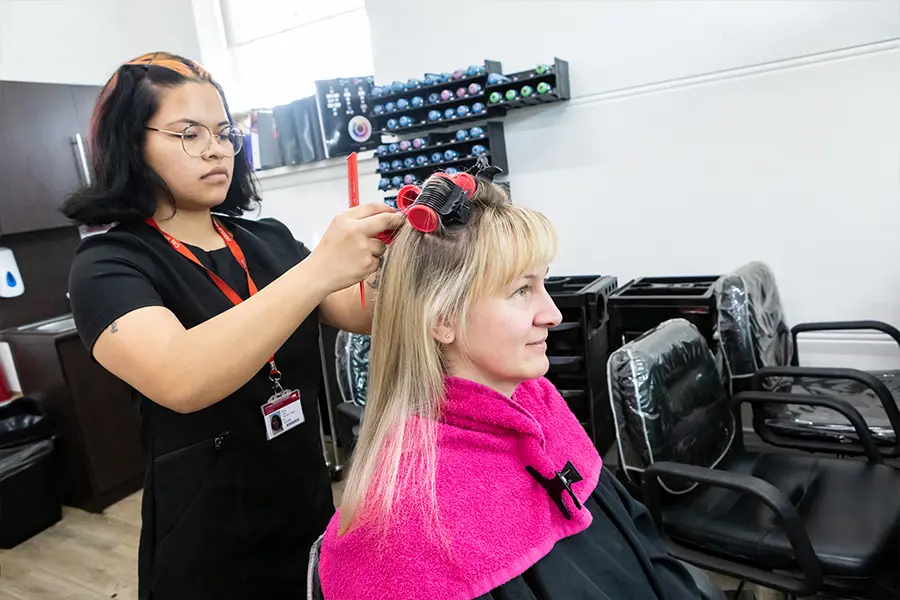


How widening participation finalist CCCG broadened access to lifelong learning
Being a finalist for the AOC Beacon Award for Widening Participation is an incredibly proud moment for Capital City College Group (CCCG). It represents the success of the college group’s initiative to increase the number of adults joining courses across London by breaking down barriers to education.
Capital City College Group shares valuable insight into the development and rollout of its successful programme of free courses for Londoners.

Free short courses for all to suit the needs of the population
With three colleges located across London, the communities that CCCG serves are incredibly diverse. Within those areas, more than 80% of individuals have an annual income that falls below the London Living Wage.
As a large education provider, it became impossible to ignore that many people across London cannot meet the costs of developing their skills. In 2017, we started discussing ways to eliminate the financial barrier to create ‘London’s First Free College’.
Taking a programme of this scale from conception to reality involved constant analysis and feedback. However, certain things were instrumental in helping us achieve our aims.
Maintaining flexibility
After experimenting with various delivery models, including full-day, part-day, mornings, twilight, evenings, and weekends, we were able to tailor courses to meet our students’ diverse needs. For example, childcare courses proved most popular on Saturday mornings or weekdays between 9.30am and 2.30pm, accommodating students‘ childcare responsibilities while enabling them to pursue qualifications.
Our planning process remains dynamic throughout the year, integrating programme developments and adjustments to reflect the evolving needs of employers, students and the local community.

Ensuring equitable access and inclusion
The programme was created to provide equitable access and further inclusion in education, so these aims have been at the forefront of our minds throughout the process.
To engage hard-to-reach individuals, we focussed our attention on:
- Strengthening key relationships: Developing our partnerships with community stakeholders and local authorities to engage with prospective students from minority communities. By supporting student transition from community-based programmes to college education, we nurture a sense of belonging for those joining the college.
- Targeting initiatives and crafting programmes aimed at underrepresented groups: For example, our ‘Women into Construction’ initiative aims to combat gender disparities in traditionally male-dominated fields.
- Providing flexible support: By taking into account diverse life situations and responsibilities and recognising obstacles (work, childcare and other commitments), we respond to students’ unique requirements and support them in overcoming barriers. Students complete a personal profile during induction, which gives teachers insights into individual requirements or challenges. Regular monitoring of student progress enables timely adjustments and interventions to support and promote engagement.

Using data
Data plays a pivotal role throughout our efforts, and we use multiple data sources to inform our development process:
- GLA and National policy priorities
- RCU Vector software (to mine data on market reach and student needs)
- Labour Market Information (LMI) software Lightcast (for real-time job postings and analytics)
Whilst data informs which courses we offer based on local, regional, and national priorities, we also use our locally-gathered data, for example by taking into account student interest expressed during the enrolment process.
Our emphasis on data helps us maintain accountability and transparency and it also supports continuous improvement to ensure that resources are allocated where they can have the greatest impact in promoting Equity, Diversity, and Inclusion (EDI).
Looking towards the future
In 2022/23, we advertised 620 short courses and received more than 13,000 bookings via our website. We hope to keep building on what we’ve achieved so far, continuing to plan with our dynamic approach, and putting together new courses to meet the ever-changing needs of employers, students and the local community.
Our in-depth self-assessment process challenges managers to check the quality of all courses, and we use student feedback and regular surveys to gather student perspectives. It’s not simply a case of adding more courses but continuing to develop and improve those already on offer.

Making an impact on the local community
So far, more than 22,000 students have benefitted from the programme, so it has had a significant impact on the college community.
In 2017/18, only 39% of students from the free courses continued in education. By 2020/2021, this had increased to 74%, with these students progressing to apprenticeships, traineeships and higher and further education.
In 2021/22, achievement rates for students aged 19+ surpassed the national average at 90.1% (the national average was 85.5%). Our achievement for several ethnic groups, including African, Arab, Caribbean, Chinese, Gypsy/Irish Traveller, Indian, Irish, Pakistani, White British, and mixed-race White and Asian/Black Caribbean/Black African students, exceeds national averages.
Want to know more about our work?
We are enthusiastic about sharing what we’ve learnt and invite other providers who wish to learn from our experiences to get in touch.
King’s Cross
London
WC1X 8RA
United Kingdom Contact Us


